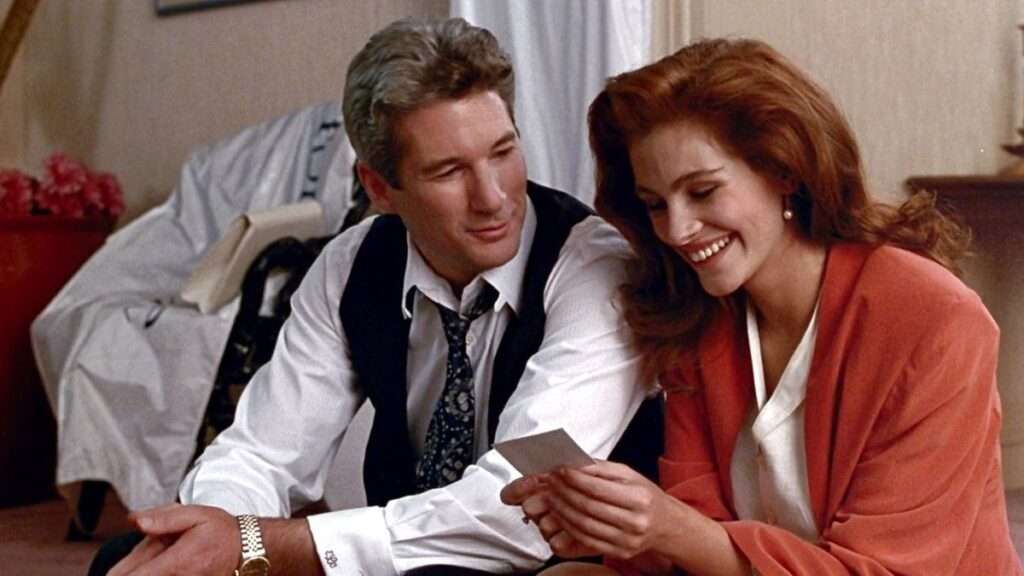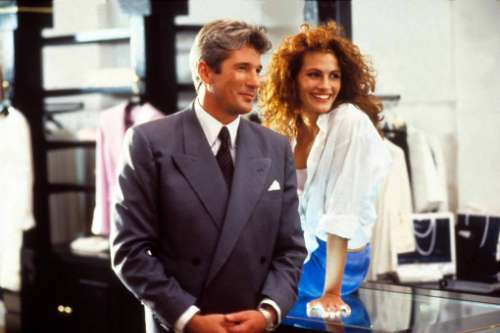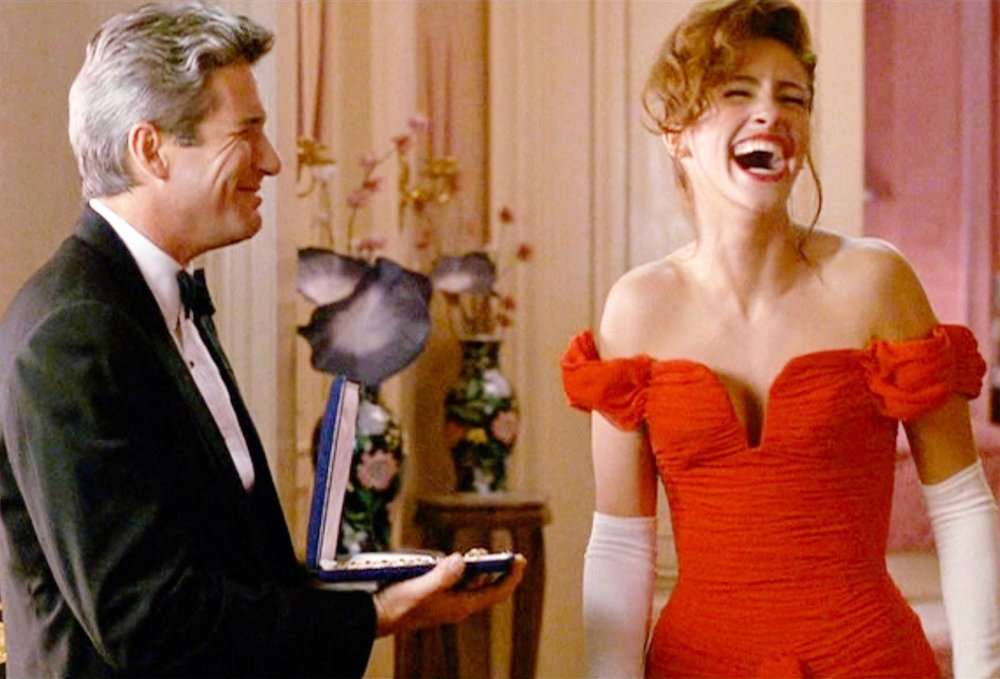Introduction
Pretty Woman (1990) is one of those rare films that transcends its genre to become a cultural phenomenon. Directed by Garry Marshall and starring Julia Roberts and Richard Gere, this romantic comedy reimagines the Cinderella story in the glitzy, morally ambiguous world of 1990s Los Angeles. On the surface, it’s a charming love story between a wealthy businessman and a vivacious sex worker, but beneath its glossy exterior lies a film that grapples with class, identity, and the transformative power of love—albeit with some problematic undertones.
Over three decades later, Pretty Woman remains a beloved classic, but it also invites scrutiny for its romanticized portrayal of sex work and its fairy-tale resolution. This review will explore the film’s strengths—its charismatic leads, witty script, and enduring appeal—while also examining its more dated and controversial aspects.
A Fairy Tale for the Modern Age
At its core, Pretty Woman is a classic rags-to-riches story. Vivian Ward (Julia Roberts), a free-spirited Hollywood Boulevard sex worker, is hired by Edward Lewis (Richard Gere), a ruthless corporate raider, to be his escort for a week. What begins as a transactional arrangement slowly evolves into a genuine connection, as Vivian’s warmth and honesty chip away at Edward’s emotionally guarded exterior.

The film follows a familiar fairy-tale structure: the downtrodden heroine is whisked away by a wealthy prince, given a makeover, and ultimately wins his heart. But Pretty Woman stands out because of its self-awareness. Vivian is no passive damsel—she’s sharp, funny, and unapologetically herself, even as she navigates the alien world of Beverly Hills luxury. Edward, meanwhile, isn’t a traditional romantic hero; he’s emotionally stunted, using money and power to avoid real connections. Their dynamic works because both characters grow—Vivian gains confidence and self-worth, while Edward learns to embrace vulnerability.
Julia Roberts’ Star-Making Performance
Julia Roberts’ performance as Vivian is nothing short of iconic. With her megawatt smile, infectious laugh, and effortless charm, Roberts turns what could have been a clichéd role into something unforgettable. She brings depth to Vivian, making her more than just a “hooker with a heart of gold”—she’s a woman with dreams, insecurities, and a fierce sense of self-preservation.

One of the film’s most memorable scenes is Vivian’s shopping trip on Rodeo Drive, where snobbish saleswomen refuse to serve her. When she returns later, decked out in designer clothes and laden with bags, her triumphant “Big mistake. Huge!” is pure cinematic satisfaction. Roberts balances comedy and emotion perfectly, making Vivian both relatable and aspirational.
Richard Gere’s Understated Charm
Richard Gere’s Edward is a more subdued character, but he plays off Roberts brilliantly. Gere brings a quiet intensity to the role, making Edward’s gradual thawing believable. His chemistry with Roberts is electric—their banter feels natural, and their romantic moments (like the opera scene) are genuinely swoon-worthy.
That said, Edward is a complicated protagonist by today’s standards. He’s initially cold and controlling, and the power imbalance in his relationship with Vivian is hard to ignore. Yet Gere’s performance ensures that Edward never comes across as a villain—just a flawed man learning to be better.
The Supporting Cast
The film’s supporting characters add texture and humor. Hector Elizondo as the kindly hotel manager, Barney, is a standout, serving as a fatherly figure to Vivian. His quiet disapproval of Edward’s treatment of her adds moral weight to the story. Jason Alexander, as Edward’s sleazy lawyer Philip, embodies the film’s critique of corporate greed, though his attempted assault of Vivian feels tonally jarring in an otherwise lighthearted romance.
Laura San Giacomo, as Vivian’s best friend Kit, provides a grounded contrast to Vivian’s fairy-tale journey. Kit’s skepticism (“This is just a temporary thing!”) serves as a reality check, reminding the audience of the harsh realities Vivian could return to.
Garry Marshall’s Direction and the Script’s Wit
Garry Marshall’s direction keeps the film breezy and engaging, blending romance, comedy, and just enough drama to keep stakes high. The script, by J.F. Lawton (originally conceived as a much darker drama titled 3,000), crackles with sharp dialogue and memorable one-liners.
The film’s humor often comes from culture clash—Vivian’s fish-out-of-water experiences in high society, her blunt honesty clashing with Edward’s polished facade. Yet it also has moments of genuine tenderness, like Edward’s gift of the opera or the final fire escape scene.
The Problematic Elements
While Pretty Woman is undeniably entertaining, it hasn’t aged perfectly. The film’s romanticized depiction of sex work is its biggest sticking point. Vivian faces little of the real danger or stigma associated with her profession—instead, her job is treated as a quirky character trait rather than a survival necessity. The idea that a wealthy man can “rescue” her plays into outdated savior tropes.
Additionally, the power imbalance between Edward and Vivian is hard to ignore. He literally buys her time, controls her appearance, and holds all the financial power in their relationship. While the film frames this as romantic, modern audiences may find it uncomfortable.

That said, Pretty Woman was never meant to be a gritty social commentary—it’s a fantasy, and judging it by realism misses the point. The film works best when viewed as a fairy tale, not a documentary.
The Music and Visual Style
The film’s soundtrack is iconic, with Roy Orbison’s “Oh, Pretty Woman” serving as the perfect theme. The score, by James Newton Howard, blends romantic orchestration with playful synth-pop, capturing the film’s blend of glamour and whimsy.
Visually, the film contrasts the neon grime of Hollywood Boulevard with the opulence of Beverly Hills, reinforcing Vivian’s journey between worlds. The costume design is also noteworthy—Vivian’s transformation from thigh-high boots to elegant red gowns is a visual representation of her growing self-worth.
Legacy and Cultural Impact
Pretty Woman was a massive box office success, cementing Julia Roberts as a superstar and revitalizing the romantic comedy genre. Its influence can be seen in countless rom-coms that followed, though few have matched its charm.
The film’s ending—Edward climbing the fire escape to “rescue” Vivian with flowers—is one of the most romantic (and parodied) scenes in cinema history. It’s pure fantasy, but it works because Roberts and Gere sell it with such sincerity.
Final Verdict: A Flawed but Enduring Classic
Pretty Woman is a film of contradictions—it’s both progressive and problematic, romantic and unrealistic. Yet its flaws don’t erase its magic. Julia Roberts’ radiant performance, the sparkling chemistry between the leads, and the film’s unabashed romanticism make it a timeless crowd-pleaser.
Is it a perfect movie? No. But it’s a damn entertaining one, and its legacy as a defining romantic comedy is undeniable.
Final Score: 8/10 – A fairy tale with bite, carried by Roberts’ star power and irresistible charm

